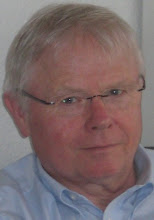What looks like a Christmas decoration in Germany is Şanlıurfa's welcome to the "City of Prophets". Peygamber is the Turkish word for prophet. The Arabs say Nabi, and so do the Jews. Şanlıurfa claims to be the home town of Abraham / Ibrahim and Job / Eyyup.
The Bible says that Abraham came from the city of Ur and that this city was in Chaldea. A long tradition places Ur into Northern Mesopotamia and makes it one with the Greek city of Edessa, which was later called Ar-Ruha by the Arabs and Urfa by the Turks. This is today's Şanlıurfa.
Now, 20th century's archeologists believe in another Ur in Southern Mesopotamia, situated near Tell el-Mukayya in Iraq. I grew up with the modern southern theory (as shown in the map below, with Abraham's journey into Kanaan as red arrows) but begin to tend to the old northern.
One reason for my newly gained cinviction is that the second city where Abraham settled was Haran. It should better be called Charran with a ch (like in Loch Lomond, pronounced the Scottish way) whereas Haran with only a simple h was the name of Abraham’s brother. Charran is today still called Harran or Charran and is a city in Northern Mesopotamia, today in Turkey. This is Abraham’s Charran, no doubt.
Now Charran is close to Urfa the northern Ur. That would give Abraham’s journey a shorter distance than in the map above (where Charran is the northern turning point) and more meaning. That is one reason why I am changing my mind about Ur.
The second reason of course is that we now are in Urfa and would like to think of walking in Abraham’s footsteps. And in Job’s since also he is thought to be from Urfa. Placing him here, too, is a Muslim tradition, where Job / Eyüp plays an important role in the Quran.
The Bible only says, that he was from eretz (g)uz the land of Uz, the g sometimes pronounced (like in Gaza) and sometimes not. One of the catastrophes that Job meet is an assault of the Chaldaens that rob his camels and kill his servants. So maybe he lived near them or among them (Chaldeans being another name for people in Mesopotamia) and could have been a citizen of Urfa, too.
Urfa was named Şanlıurfa, (pronounced SHUNN- leh-oor-fah) "the glorious Urfa" in 1984 to commemorate its strong resistance in the Turkish War of Independence between 1919 and 1923.

The region around is receiving water from the giant Turkish dam projekt. It is a green garden with corn, mais and cotton. In our bus we feel like "Down in Louisiana" and beginn to sing that good ol' Cottonfield song.





I doubt anyone else but you would unite Loch Lomond, Ur and Gaza in the same post. To me it shows a broad mindset and a good sense of humor at the same time. Greetings from Germany (the "G" pronounced as in "Jesus"...)
ReplyDelete